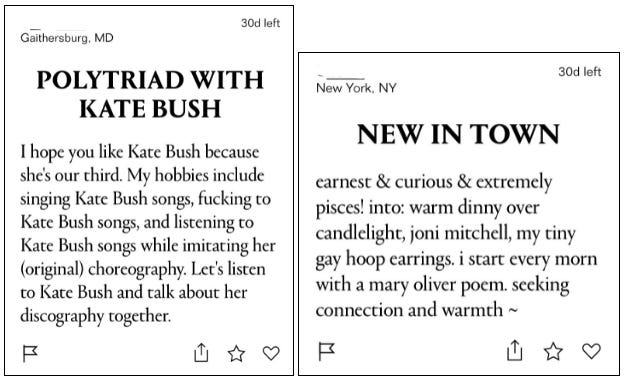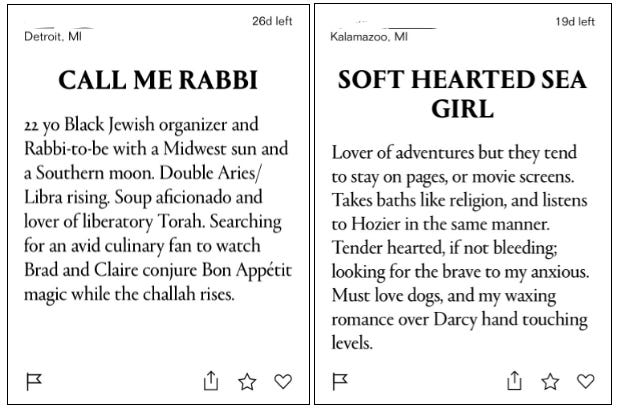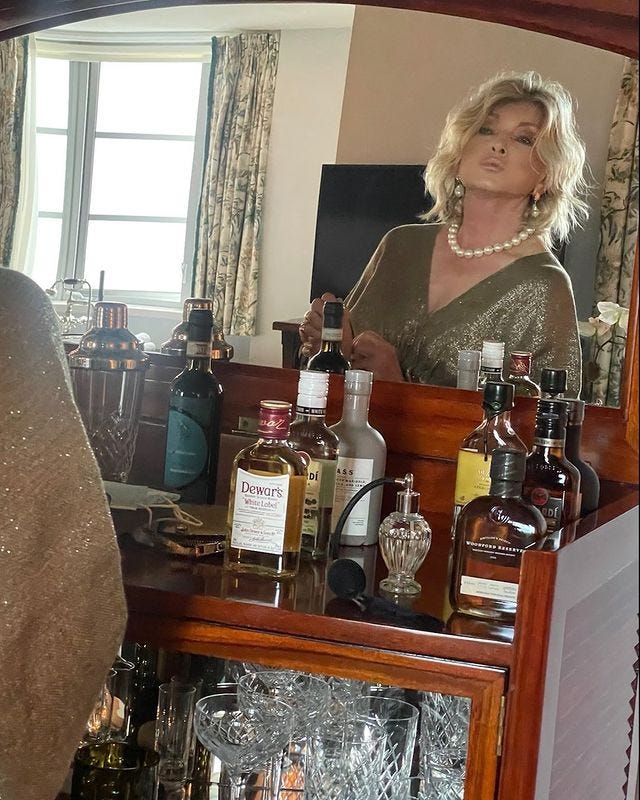Lex is the Queer Dating App of The Future (and the Past)
On Text Over Images
This is the Sunday edition of Paging Dr. Lesbian. Plus, this week’s dispatch from the lesbian internet. If you like this type of thing, subscribe!
In this image-saturated internet age, we often succumb to the fantasy of nostalgia for a freer, pre-digital era. This fatigue with visual culture is felt acutely by those of us on the dating app scene, where the judgment-based gamification of dating often becomes tiresome, and even downright disheartening.
Enter Lex, a queer dating app that came out in late 2019. Lex, a text-based dating and social app founded by photo editor Kell Rakowski, is the first dating app “where the text comes first, and the selfies come second.”
Lex’s origins can be traced back to an Instagram account called h_e_r_s_t_o_r_y, run by Rakowski, which focused on images from lesbian and queer history. While running the account Rakowski discovered On Our Backs, a lesbian magazine from the 1980s. The magazine featured personal ads, which inspired Rakowski to start another account called @_personals_, where she posted some of these vintage ads.
Followers loved the idea and began asking if they could submit their own ads, so Rakowski created a new @_personals_ account for expressly this purpose in 2017. The number of personals being submitted eventually became too much for Rakowski and her small team to handle, and after gathering donations from Kickstarter and from personal ad posters, Lex officially went live on November 7th, 2019.
Lex represents both a departure from typical dating app conventions, as well as a potential way forward for the queer community in the digital age. It addresses the broader image-based dating app fatigue, while also focusing specifically on the needs of queer women, trans, and non-binary people.
The biggest difference between Lex and other dating apps (including queer-specific ones like HER), is the focus on text over images. One of the advantages of this text-based strategy is that it minimizes the culture of intense judgment that is a part of most dating apps. It lets users define themselves in exactly the terms with which they would like to be understood, with the knowledge that physical appearance is no longer the first thing anyone sees. This allows users to connect with one another through humor, shared interests, or intellectual connections, rather than focusing entirely on physical attraction as a basis for compatibility.
Of course, some users still connect their Instagram account to their Lex profile, but this still means that you must search for these images if you wish to see them. (A user’s Instagram photos do not appear anywhere on the Lex app like they do on Tinder or Hinge – you must leave the app entirely in order to view any Instagram photos).
To be sure, this focus on text instead of images does not mean that Lex is an entirely judgment-free space. Users still may judge ads based on their perceived reliance on stereotypes (too many ads referencing cats, or astrology), their lack of creativity, or a number of other factors. Still, it is significant that this judgment is based on characteristics entirely divorced from how someone looks.
The app also boasts a “missed connections” function, where users can make posts about a cute barista they chatted with, or someone hot they walked past in Home Depot, for example. This service in particular has a very rom-com-like quality to it, but with that extra dash of niche queer eccentricity.
Lex’s focus on text also allows users to get a sense of the breadth and diversity of the queer community, something that may not be visible to us on a daily basis. While the app lets you restrict both the age and the location of users who appear in your feed, similar to most other dating apps, there is also a feature that allows you to set your location range to “world.” Looking at personal ads on Lex from users around the globe is a really fascinating way to get a sense of what the queer community looks like today (though not literally, of course).
Perusing ads on Lex might give you an idea of what kind of things queer women and trans and non-binary people are into these days (when I originally started working on this article several years ago, it was Bon Appétit videos and Hozier), the different ways that people define their gender and sexuality (“fat bicon,” “the perfect mix of butch and twink,” “buff dad-bod stone butch daddy,”), and how they define their passions and their politics. On a personal level, it makes me feel energized to be a part of the queer community when I go on Lex and see everyone’s always creative, sometimes kinky, and often hilarious personal ads. In this way, Lex provides a space for users to find potential platonic, romantic, or sexual partners, while also providing users with a broader view of the queer community. As the app has gained popularity its uses have expanded even further, with users looking for housemates, creative or professional connections, or any other relationship you might be able to think of.
Because Lex is explicitly marketed towards queer women, trans, and non-binary people, this means it can act as a safe space for users to freely express their sexual and gender identities and desires. While many queer women continue to use Tinder, which allows you to choose which gender(s) you are interested in seeing, Tinder has also become a place that is chock-full of couples looking for “unicorns.” If you are (blessedly) unaware of what it means to be looking for a unicorn, it means a man and a woman who are interested in finding a “third” (an additional sexual partner, usually female) to spice up their relationship. For queer women, this can feel very fetishizing, and is one of the reasons some have left Tinder entirely.
On Lex, because cisgender men are nowhere in sight, and because users often define their desires in such personal, specific terms, this fetishization seems almost entirely absent. (I should note that unicorn-seekers are mostly absent from HER as well, but apart from its focus on queer women, HER is very similar in form to Tinder). The app feels safe in this way because it is both an exclusive space (cisgender men are not present on the app) and an inclusive one (Lex’s description refers to several often-overlooked groups such as asexual, genderqueer, intersex, and Two-Spirit people).
However, it is never a guarantee that an app like this will be a truly safe space for queer people of color. Rakowski came under fire in January 2019 for responding negatively to an Instagram account called QPOC Personals, which functioned in a similar way to the @_personals_ account except it was exclusively maintained by and for QPOC. To address this issue, the Lex team – Rakowski, Anita Osuala, and Lisha Payne – have pledged to make sure the app is a safe space for QPOC, noting this priority on their Instagram story.
More recently, Lex has been updating its formatting and functionality to more accurately reflect how it’s being used by users. First, the app was updated to include several options for emoji reactions to personals (pictured below), including a heart sign, fire sign, a u-haul symbol, and a violet. This gives users the freedom to react to a post in whatever manner best indicates their interest, whether it be friendly, romantic, or otherwise.
The app has also recently been updated to include a “profiles” feature: still no pictures, but the option to include an “about me” section along with your name and age (your zodiac sign is automatically added, and as far as I can tell, you can’t delete it). This allows Lex to feel slightly more like a social media platform or a standard dating app, without losing the essential qualities that draw users in.
When I asked on the app itself (in the form of a personal ad) what users liked about Lex, I was flooded with responses. Many people were specifically enamored with the no-photos anonymity of the app, as well as how it gives users the option to be very specific with what they are looking for. One user was even doing a photo project based on the format of Lex where they were going to take people’s portraits without showing their faces. Another user noted that many people are now posting messages expressing solidarity with Palestine or relaying information about upcoming protests, which is the sort of information that this person said caused their Tinder account to get deleted. As far as I am aware, this type of censorship has not occurred on Lex. Below are some other responses I got when I asked people to share what they liked about the app.
I also don’t know if i’m attracted to someone based on a photo, so swiping on photos w/a a snappy bio is basically guessing games. I’ve been able to be straightforward w what i’m looking for on here–ppl who don’t want that don’t interact & ppl who do, do!
I love that people cant see pictures of me first thing so there are no assumptions based on appearance, and no one tells me they can’t tell what my gender or sex is and then asks what it is first thing
I like the simple format and that the base assumption isn’t that you’re looking for romance or hookups
No profile picture, the anonymity, I don’t feel exposed or judged, there is no comparison to others and you can people that you would never talk to otherwise. The fact that I can talk to people from all over the world that’s cool.
What I love about lex is that it feels more like a social media than a dating app, and it’s like a mix à both and it’s really cool!
Lex has a unique connection to the past. As a social media platform inspired by queer media of the pre-digital age, the app itself pays homage to the queer women and non-binary people who have come before us, while also creating new forms of community engagement. Lex uses digital media to bring back a pre-internet form of communication for queer people, and in doing so bridges the gap between the past and present. Younger queer people are able to imagine what it might have been like to be queer in the late 20th century, while also taking advantage of the affordances of modern digital communication.
While nostalgia can often be a dangerous, regressive force – think Donal Trump’s famous slogan, or the recent outcry about diverse casting practices “ruining” people’s childhoods – in this case, the nostalgia associated with Lex takes what was innovative and useful about the past, and discards what was not. (Namely the trans-exclusion that sometimes, but not always, was a part of lesbian culture in the 20th century).
In this vision of a queer future, the past and present combine to create something that is both old and new. Perhaps, this vision is a way forward.
Welcome to this week’s dispatch from the lesbian internet.
On Monday, it was announced that cops will be banned from New York City Pride until at least 2025. This is great news, particularly when you remember that Stonewall (which birthed the modern gay rights movement) was literally a riot against police brutality. As someone said in the comments on Twitter, stop inviting abusers to the party! But of course, we couldn’t celebrate this good news in peace – The New York Times editorial board had to go and write about how this new rule was a “misstep,” which led some people to remind everyone how the New York Times has not been a friend to gay people in the past.
Also this week, Kacey Musgraves cosplayed as a lesbian and Demi Lovato came out as non-binary, announcing that they will now be using they/them pronouns.
Speaking of non-binary celebs, on Wednesday it was announced that Sara Ramirez will join the Sex and the City revival, playing the show’s first-ever non-binary character, a stand-up comedian named Che.
On Friday, Martha Stewart blessed our timelines by posting yet another thirst trap on Instagram. She is already having the hot girl summer of our dreams.
Also this week, Kathryn Hahn showed up to the MTV Movie & TV Awards looking like this and people had some feelings. (This followed the now-famous Lee Pace post-vaxx selfie, which I only mention because Lee is one of 3 celebrity men who I trust and because I love and support bisexuals).
That’s all for this week, folks! Stay tuned for next week’s adventure. I will leave you with this.














